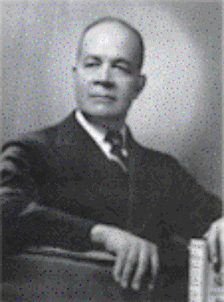Joel Augustus Rogers
Joel Augustus Rogers was born in Sheffield, Westmoreland, in 1880. He was the son of Samuel and Emily Rogers, and his father was a schoolmaster, who moved to the Buff Bay area of Portland around 1882, and then to St. Ann in 1887. Emily Rogers died in Portland in January, 1887, at the age of 28, leaving four young children. In October 1887 Samuel remarried, certainly in part to provide a mother for his children; he and his second wife had eight children. Joel Rogers would certainly have received a conventional Jamaican elementary education of the time, which would have equipped him especially with an excellent grasp of Standard English. He also recorded having been indoctrinated as a child with the idea of the inferiority of Black people, though he grew up among Black Jamaicans who were physicians and lawyers, graduates of the best Canadian, English and Scottish Universities. It is stated in some accounts that he spent four years in the army, which one would imagine would mean in the British West India Regiment, in which many other young Jamaican men enrolled. [Other accounts say he served in the Royal Garrison Artillery at Port Royal.]
In 1906 he left Jamaica for the USA, arriving in New York on July 23, as the Ellis Island records show; in 1917 he became an American citizen. He lived at first in Chicago, and later in New York, at 37 Morningside Avenue in Harlem, where he had his extensive library and was visited by those who were interested in his work. In his early years in the USA he worked as a Pullman porter, which gave him a broad knowledge of the country, including having to pay the White conductor to borrow library books for him in segregated states. He is also said to have studied art in Chicago, and to have been stimulated by contacts in that city to begin his study of Black history. After working perhaps as a teacher and in a brokerage firm, by the 1920s he had started on a career as a journalist, writing especially for the Amsterdam News, a leading Black newspaper, published in Harlem. He also wrote for other publications such as the magazine The Messenger.
From the mid-1920s on he travelled widely in Europe and Africa doing research in museums and libraries, acquiring in the process a good knowledge of French, Spanish, Portuguese and German. In 1930 he was in Addis Ababa representing the Amsterdam News at the coronation of Haile Selassie. About this time he began his long connection with the important Black newspaper the Pittsburgh Courier, being the paper’s war correspondent in Ethiopia during the Italian invasion in 1935-6. One of Rogers' most influential contributions to the Courier was the educational comic strip entitled ‘Your History’ which presented the readers with the results of his researches into the history and achievements of people of African ancestry over time, all over the world.
Joel Rogers did not return to Jamaica until 1965, about a year before his death. In a talk at the Institute of Jamaica, sponsored by the Jamaican Historical Society, he commented on the fact ‘that Jamaica was efficiently run by a stable Government, and was self-governing’, and referred to developments in Jamaica, as ‘amazing’ and a ‘great surprise’.
He died in New York on March 26, 1966, after a few days' illness following a stroke. By his request his funeral was not opened to the public.
In 1906 he left Jamaica for the USA, arriving in New York on July 23, as the Ellis Island records show; in 1917 he became an American citizen. He lived at first in Chicago, and later in New York, at 37 Morningside Avenue in Harlem, where he had his extensive library and was visited by those who were interested in his work. In his early years in the USA he worked as a Pullman porter, which gave him a broad knowledge of the country, including having to pay the White conductor to borrow library books for him in segregated states. He is also said to have studied art in Chicago, and to have been stimulated by contacts in that city to begin his study of Black history. After working perhaps as a teacher and in a brokerage firm, by the 1920s he had started on a career as a journalist, writing especially for the Amsterdam News, a leading Black newspaper, published in Harlem. He also wrote for other publications such as the magazine The Messenger.
From the mid-1920s on he travelled widely in Europe and Africa doing research in museums and libraries, acquiring in the process a good knowledge of French, Spanish, Portuguese and German. In 1930 he was in Addis Ababa representing the Amsterdam News at the coronation of Haile Selassie. About this time he began his long connection with the important Black newspaper the Pittsburgh Courier, being the paper’s war correspondent in Ethiopia during the Italian invasion in 1935-6. One of Rogers' most influential contributions to the Courier was the educational comic strip entitled ‘Your History’ which presented the readers with the results of his researches into the history and achievements of people of African ancestry over time, all over the world.
Joel Rogers did not return to Jamaica until 1965, about a year before his death. In a talk at the Institute of Jamaica, sponsored by the Jamaican Historical Society, he commented on the fact ‘that Jamaica was efficiently run by a stable Government, and was self-governing’, and referred to developments in Jamaica, as ‘amazing’ and a ‘great surprise’.
He died in New York on March 26, 1966, after a few days' illness following a stroke. By his request his funeral was not opened to the public.
Daily Gleaner, April 13, 1966 |





